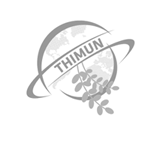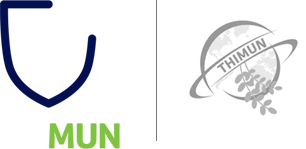General Assembly
Size: 200-300 delegates
(all 5 General Assembly Committees)
Difficulty: Advanced
Simulating the main policy making organ of the United Nations, the conference’s General Assembly session takes place during the final day of the conference and hosts all delegates of the 5 GA committees (see below). In order, the main submitters of the best resolution passed from each GA committee present their resolution to be debated upon and voted on by the delegations present. The General Assembly is an opportunity for delegates to interact with and debate on topics outside of their committee while working as a team with the rest of their delegation. It also provides a stand to speak in front of an extraordinarily large audience, an exhilarating public speaking challenge.
1st GA Committee (GA 1)
Size: 40-60 delegates
Difficulty: Advanced
Also known as the Disarmament and International Security committee, the 1st GA committee, deals with challenges and threats to peace and the security of the international community. Its agenda items vary from more general discussions on principles and standards regarding, amongst others, the reduction of armaments and the promotion of cooperation for peace and security, to more specific contemporary regional or cross-regional challenges where delegates are called to implement solutions following the principles of the United Nations. Debate topics might often be contentious and delegates in this committee need to have an excellent understanding of the sensitivity of their countries’ policies, along with a well-rounded view of global historical and military developments in order to be successful.
2nd GA Committee (GA 2)
Size: 40-60 delegates
Difficulty: Intermediate – Advanced
The 2nd GA Committee specialises in Economic and Financial (EcoFin) affairs. It deals with a broad range of issues linked in some way to promoting economic growth and development across the world. Its agenda items usually range from broader discussions on reviewing financial standard practices of organisations and governments to more specific questions or challenges to global and regional economic stability and human development. The delegates will be engaging in detailed and sometimes technical and/or contentious discussions pertaining to the effective application of micro and macroeconomic policies and principles. Delegates have an opportunity to employ problem-solving skills and appreciate the adverse and uncertain effects of policy-making on different stakeholders, across many different economic landscapes.
3rd GA Committee (GA 3)
Size: 40-60 delegates
Difficulty: Beginner – Intermediate
The 3rd GA Committee is the Social, Humanitarian and Cultural Committee. It targets all three components equally, i.e. social issues (e.g. gender discrimination), humanitarian crises (e.g. refugees) and cultural matters (e.g. protection of cultural heritage in time of war). It adopts a wider scope than the Human Rights Council (see below). Delegates here can develop an inclusive and holistic way of thinking, called to support different groups of people in distress with varying needs. To be successful delegates need to have a well-rounded appreciation of the cultural and social identity not only of their delegation’s country,but also of all other parties involved.
4th GA Committee (GA 4)
Size: 40-60 delegates
Difficulty: Advanced
The 4th GA Committee deals with Special Political and Decolonization affairs. Its agenda has a broad scope usually including the resolution of some specific case of territorial dispute related to decolonisation, the reconsideration of the nature of peacekeeping and/or special political missions and other possible diplomatic and political challenges that are in some way connected to decolonisation. Delegates in this committee frequently have to deal with complex and vaguely defined or contested concepts, while they also have to try and establish communication and understanding between parties with clashing and sometimes very rigid beliefs.
6th GA Committee (GA 6)
Size: 40-60 delegates
Difficulty: Advanced
The Sixth Committee (Legal) is the primary forum for the consideration of legal questions in the General Assembly.
Security Council (UNSC)
Size: 15 delegates
Difficulty: Advanced
The United Nations Security Council (UNSC) is the principal decision-making organ of the organisation. It is the only organ whose decisions can be legally-binding and it has the authority to issue sanctions to countries violating its principles; as such it deals with the most critical challenges to international peace and any crises that need immediate or direct action in order to be resolved. Due to its critical nature, 5 of its 15 members hold permanent seats (the rest change every two years) and thus reserve the right to prevent any proposal from officially being adopted regardless of whether a majority is reached (the veto power). Debate takes place clause by clause instead of on entire draft resolutions and as such all delegates have the chance to present clauses to be debated and voted upon more than once. However, usually considering very contentious topics, delegates need to be very dedicated, alert and flexible as they are tasked with balancing conflicting opinions in order to arrive at some sort of direly needed, commonly acceptable solution. Delegates ought to have an extensive and confident understanding of their delegation’s limits and pragmatic aims which strictly guide their decisions when voting, especially if they are representing a permanent member.
Economic and Social Council (ECOSOC)
Size: 30 – 54 delegates
Difficulty: Intermediate
The UN Economic and Social Council (ECOSOC) is one of the principal UN organs and deals, as the name suggests, with socio-economic issues, emphasising on the underlying connection between social and economic problems. The most typical example of this would be unemployment, which has causes and repercussions stemming from both fields. Compared to the 2nd and 3rd GA Committees (see above), this Council’s agenda items are not “purely” economic or social/humanitarian in nature: it deals with both components simultaneously. As a result, it is less technical than the 2nd and often more complex than the 3rd GA Committees.
World Health Organisation
Size: 40 – 60 delegates
Difficulty: Beginner to Intermediate
The World Health Organisation (WHO) discusses current medical affairs and standards, and focuses on issues of global pandemics or emergencies. Despite having a specialised focus, its topics are moderately contentious and, since debate pertains to policies, it does not become overburdened with advanced medical concepts. Delegates with an appreciation of the broader health sector and its impact on society will have a chance to engage in debate following clear and not very restrictive country policies.
Human Rights Council
Size: 30 – 47 delegates
Difficulty: Beginner
The UN Human Rights Council (HRC) is a subsidiary body of the UNGA. The scope of this Council focuses purely on human rights violation issues and, by extension, the promotion and protection of human rights (e.g. the prohibition of child soldiers). With a very clear mandate, delegates having an understanding of the universal declaration of human rights will engage in exciting debate trying to reconcile different interpretations of human rights to resolve distinct issues of human suffering and exploitation. The limited scope and clear topics discussed lead to an accessible experience for people interested in welfare and human rights.
Environment Commission
Size: 50 – 60 delegates
Difficulty: Beginner
The Environment Commission (EC) is a variation of the UN Environment Programme, a UNGA subsidiary body. The commission deals with a variety of topics all linked with the protection and restoration of the environment. Debate typically revolves around tangible issues that might often have to do with daily life practices; as such, delegates can gain experience in extensive and detailed lobbying and debating without encountering too complicated and abstract concepts.
Special Conference
Size: 50 – 60 delegates
Difficulty: Intermediate
Each year, CGSMUN has a different global theme, which is addressed in a Special Conference (SPECON), as well as having direct or indirect links with most agenda items of all other Committees. The special conference is not bound by a specific mandate and so hosts a mix of topics ranging from socio-economic to scientific, to political and security issues amongst others. This lack of a clear focus introduces a level of difficulty, but also uniquely provides delegates with a chance to experience a variety of different debates. Delegates thus finding it difficult to commit to a specific debate field will find this option interesting even though they will have to gain an extensive understanding of their delegation’s status in widely different fields. This is a committee for delegates who enjoy research and find the conference’s theme of great interest.
Youth Assembly
Size: 20 – 50 delegates
Difficulty: Beginner
The Youth Assembly (YA) is a special assembly created for new and less experienced members of the MUN. In the Youth Assembly, delegates represent themselves and debate on 2 different issues creating an Action Paper. The lack of a need to research and follow a specific country’s policy makes preparation and research for this committee more accessible, while it also encourages more unrestrained, creative development of personal ideas. The structure of the action papers is meant to highlight the multiple and distinct levels of thinking that exist in the process of drafting solutions, such as recognising the issue and its impact, while avoiding conceptually dense or ambiguous phrasings. Having only two topics to debate allows for much greater lobbying and debating time margins creating a less stressful environment where delegates are encouraged to ask questions and tackle concepts and MUN procedures at a more comfortable pace.
International Court of Justice
Size: 15 Judges and 4 Advocates
Difficulty: Intermediate (Judges), Advanced (Advocates)
The International Court of Justice (ICJ) is a principal UN organ that operates in a totally different way from all other MUN Committees. It simulates the UN ICJ, headquartered in the Hague, where countries (not individuals or parties) are tried. Should a UN member state feel another country has breached international law, then it can take the other country to the ICJ, resulting in cases such as “Construction of a Road in Costa Rica along the San Juan River (Nicaragua v. Costa Rica)” (8th CGSMUN 2013). Each country is represented by 2 Advocates, each of whom is to present evidence and question witnesses (typically including Ambassadors of the relevant countries) in order to prove to the 15 Judges and the Presidents that their country is right.
UNESCO
Size: 20 delegates
Difficulty: Beginner
UNESCO is the United Nations Educational, Scientific and Cultural Organization. It contributes to peace and security by promoting international cooperation in education, sciences, culture, communication and information. UNESCO promotes knowledge sharing and the free flow of ideas to accelerate mutual understanding and a more perfect knowledge of each other’s lives. UNESCO’s programmes contribute to the achievement of the Sustainable Development Goals defined in the 2030 Agenda, adopted by the UN General Assembly in 2015.
UNDRR
Size: 30-50 delegates
Difficulty: Intermediate
The UN Office for Disaster Risk Reduction (UNDRR) is dedicated to helping countries and communities lower risk and raise resilience in the face of natural and human-induced hazards. Its work is guided by the Sendai Framework for Disaster Risk Reduction, a 15-year agreement adopted by the international community in 2015, which was the first building block of the 2030 Agenda for Sustainable Development.
UNWTO
Size: 30-50 delegates
Difficulty: Intermediate
UN Tourism is the United Nations agency responsible for the promotion of responsible, sustainable and universally accessible tourism. As the leading international organization in the field of tourism, UNWTO promotes tourism as a driver of economic growth, inclusive development and environmental sustainability and offers leadership and support to the sector in advancing knowledge and tourism policies worldwide. UNWTO encourages the implementation of the Global Code of Ethics for Tourism, to maximize tourism’s socio-economic contribution while minimizing its possible negative impacts, and is committed to promoting tourism as an instrument in achieving the Sustainable Development Goals (SDGs), geared towards reducing poverty and fostering sustainable development. UNWTO generates market knowledge, promotes competitive and sustainable tourism policies and instruments, fosters tourism education and training, and works to make tourism an effective tool for development through technical assistance projects in over 100 countries around the world.


